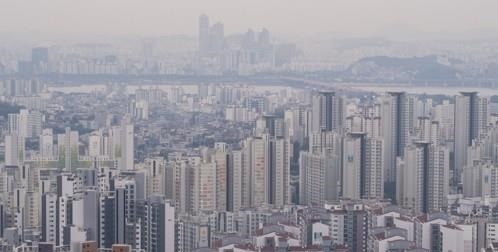 |
This photo taken Oct. 21, 2020, shows apartment complexes in central Seoul. (Yonhap) |
After a series of meetings among ministers and high-ranking officials earlier this month, the South Korean government is expected to roll out another package of measures to address issues linked to the soaring cost of housing offered through “jeonse” contracts.
Jeonse is a two-year housing rental agreement that involves a large lump-sum deposit in lieu of monthly rent.
The new measures are expected to include supplying more than 100,000 subsidized homes for low- and middle-income families in Seoul and nearby cities as early as the first quarter of next year, according to news reports.
The Ministry of Land, Infrastructure and Transport, the Ministry of Economy and Finance, and the Seoul Metropolitan Government will reportedly announce the new plans to stabilize rents at a meeting led by Deputy Prime Minister and Finance Minister Hong Nam-ki on Wednesday.
The new measures come after the government recently implemented rules to protect tenants, including a 5 percent cap jeonse contract increases and a mandate for tenants to unilaterally renew their two-year contracts for another two years.
“The government is considering different options, including a buy-and-lease model and a scheme to buy houses that are planned to be built or currently under construction, and rent them out later,” a government official was quoted as saying by local news outlet Asia Economy.
“It plans to supply 100,000-plus house units in Seoul and surrounding areas,” the official added.
Via the buy-and-lease strategy, the government would purchase existing homes and lease them to members of the public. This is seen as a way to address the supply shortage swiftly, as it would take less time to execute, compared with buying land or buying homes under construction.
The government initially planned to announce new rental market stabilization plans last week at the meeting presided over by Deputy Prime Minister Hong, but the details of the meeting were not disclosed as participants reportedly felt it was necessary to fine-tune the measures.
The Korean government’s efforts to cap rental price hikes and stabilize the entire property market have so far come to no avail.
For the August-October period since the implementation of the tenant protection measures in July, jeonse prices in Seoul increased 1.45 percent on average, much more than average property sale prices during the same period, which grew 0.21 percent.
The average growth rate of jeonse prices across the nation came in at 0.27 percent last week, the second-highest figure since the Korea Appraisal Board started compiling relevant data in May 2012. The figure for regions outside Seoul and the surrounding cities came to 0.29 percent, the record high. Increased jeonse prices are considered to have pushed up sale prices in the nation as well. The average growth rate of sale prices across the nation stood at 0.21 percent, the second-highest after 0.22 percent recorded in the fourth week of June this year.
By Kim Young-won (
wone0102@heraldcorp.com)








